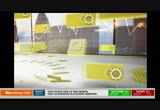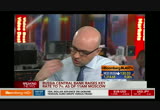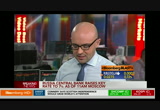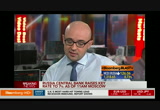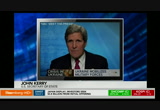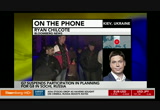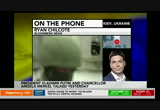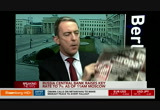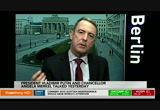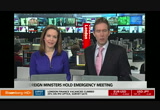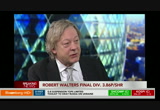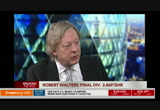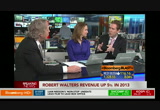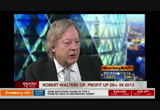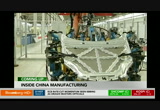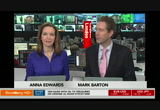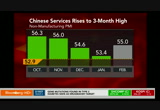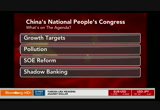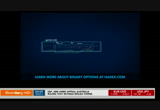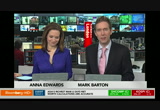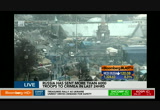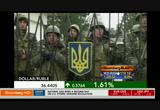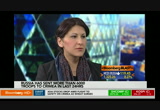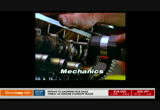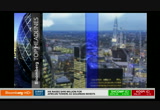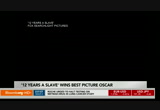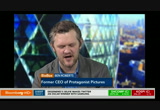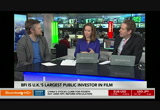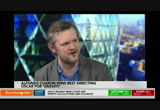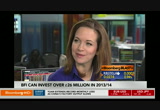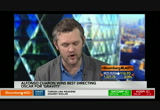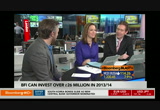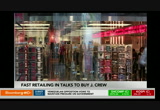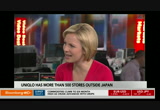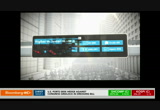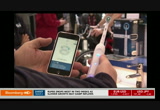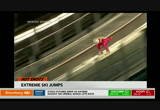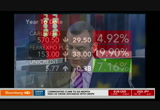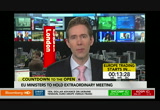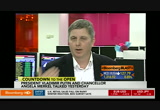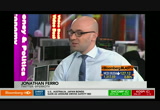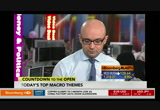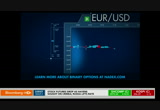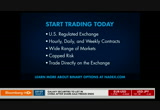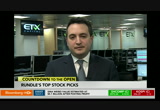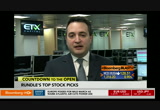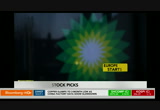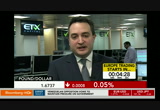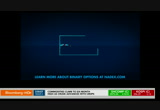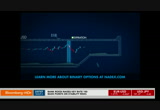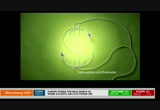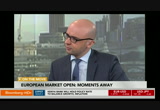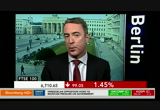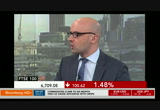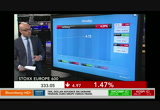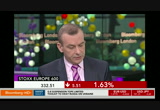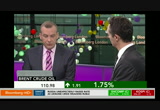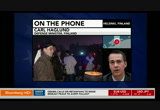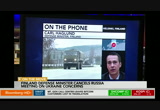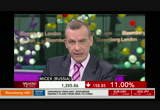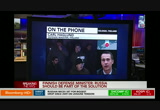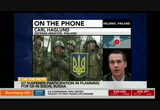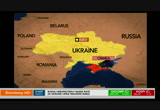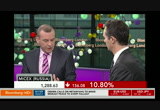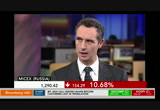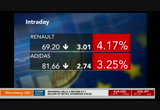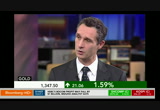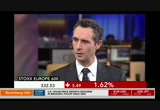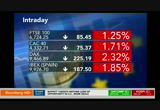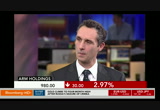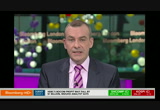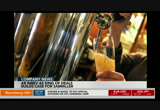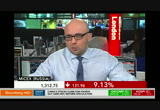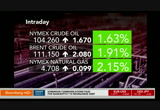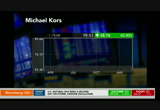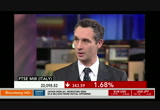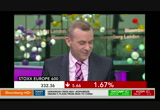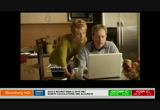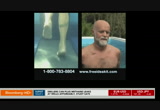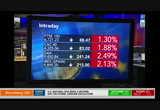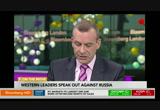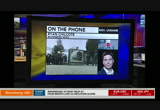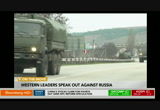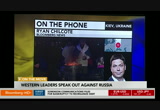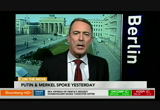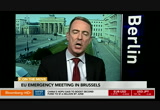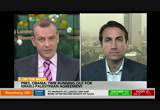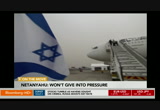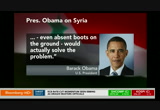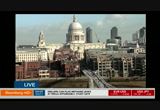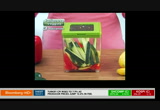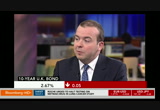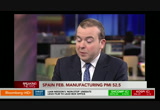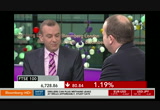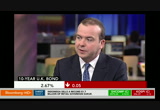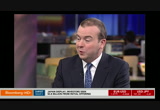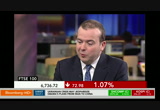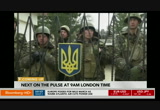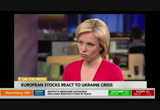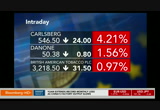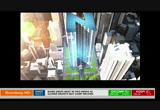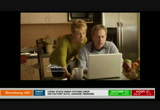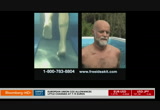tv Countdown Bloomberg March 3, 2014 2:00am-4:01am EST
2:00 am
2:01 am
>> welcome to countdown, i'm mark barton. >> i'm anna eds. . international pressure on russia following its seizure of its crimea region. our europe editor david swede is following the e.u. summit taking place in brussels. berlin, of course. jonathan has the market reaction. jonathan, plenty of market reaction. >> you look at the russian equity market, headed to the biggest drop. the ruble holding up a little bit for one reason. the russian central bank has come out of high rates from 5% to 7%. they cite the rates are intended to prevent inflation risks. what it doesn't do is take away that political risk. you saw what happened in turkey when they hiked rates.
2:02 am
a complete turn-around again. in the broader markets, you are seeing general risk aversion. the swiss franc into gold. >> it feeds a matter of time before they were going to raise rates, wasn't it, john? inflation has been above the central bank's target for 17 months. the target is 5%. they are well above the targets. investors waiting for a long time for this to happen, haven't they? >> they have a measure. it is a vanishing act, isn't it? their revenue is from gas and oil, so the so it is not the end of the world. but when you have a inflation, you have to step in and do something about it. >> meanwhile, crude oil is higher, natural gas is higher. this is all because of what's happening in ukraine? >> you have the biggest energy user. we see these spikes in oil when we have tensions rise in the
2:03 am
middle east, and then they come back down again when you see those recede. when people talk about trade sanctions, you can see how it could hit the likes of russia. 20% of their national income comes from natural gas alone. so it could hurt them. you have to say, russia is not iran. i was looking at some of the stats from b.p. statistical review. a third of natural gas imports into e.u. come from russia. any kinds of trade sanctions there would hurt russia, and it would hurt europe, too. >> and there are questions raised about what will be the spongs in terms of sanctions, but also what will be the russian response with regard to gas supplies. the gas problem has been suggesting it could end natural gas discounts to ukraine and that could have effects to the rest of europe. >> it would definitely do that. the gas problem today is one of the biggest in the equity market down to almost 10%.
2:04 am
they are -- down almost 10%. they are getting hit hard. really, this is another example where you haven't got one. the biggest threat at the moment is to throw russia out of the g-8. what will that do? >> let's hear from our man on the ground what the response might be. ryan is in kiev. what do they think could be repercussions from the international community? >> well, kerry is on his way here. he wants to do two things. one, prop up ukraine by directly expressing support for ukraine. some think this russian intervention adds impetus to is push to a russian-led apec, which comes later in the week. on the other hand, he may want to punish russia with whatever leverage they have. he spent the better part of yesterday on the phone with a whole host of leaders. have a listen.
2:05 am
>> it is really 19th century behavior in the 21st century. there is really no way to start with, if russia persists in this, that the g-8 countries are going to assemble in sochi. that's a starter. >> and one thing, he's been talking about the ruble weakening. we're seeing more of that today or the prospect of more of that happening today. so i think kerry thinks, and the u.s. thinks, that some of russia, that asome of the punishment for russia will be self-inflicted. they are also talking about asset freezes, visa bans. the u.s. does $40 billion in trade with russia. kicking russia out of the g-8, or at least not going to the g-8 which was supposed to be in soachy in june. -- sochi in june. one american official also dropped the idea of sanctions on russian banks.
2:06 am
>> what happened with the russian ukraine riot still needs -- they still need $15 billion over the next several years. that has been put on the back burner, hasn't it, with the events over the weekend? >> it has, and there's a sense that that's ok. while they are asking for $15 pill bill in aid and while they need $13 billion over the next 12 months, there is a bit of a lull in their debt repayments between now and june when some sizable payments need to be made. so i think they think they have a little time. there are people out there that think the idea of russian military intervention in crimea would actually complicate any package. i was dis-- discussing that yesterday with one of the country's richest people. he didn't agree with that. he pointed out the i.m.f. is already working with countries like moldova which also has russian troops on its soil in
2:07 am
the same situation that it would appear we have in ukraine. so it looks like they have a little bit of breathing room, in terms of time to get this financial assistance to the i.m.f. they will be very mindful that it is important to get it lined up, that the ukrainians have said they would like to have it in place by april so as to not lose the initiative. there are some people out there that think that russian military intervention could strengthen their hands with the m.f., maybe lead to less conditionalities, maybe more money they were going to get, faster money as this gets more geopolitical and pressure comes from the united states on the i.m.f. to do something. >> ryan, thank you. that report live from ukraine. >> david tweed is in berlin. what has the reaction been in germany? the lines of communication between putin and merkel seem
2:08 am
to be open. >> they are. let me give you an idea of how the newspapers are looking at this, guys. you can see the biggest selling newspaper in all of europe "the bild" suggesting "will there be a war in europe?" there is a question about whether putin is risking a war in europe and also making reference to that phone call that angela merkel had with vladimir putin where she condemned the action. she said it breaks international law. she's suggesting there should be a task force going into russia for the osce -- this is a human rights organization -- to actually verify or see if any of these claims that the human rights of russian speakers in the ukraine aring hit upon. this is something also being supported by nato and the united states. the other thing i would just point out is that angel
2:09 am
merkel hasn't gone, say, as ohn kerry in talking about sanctions. maybe we'll hear more about that from the european foreign ministers who will be meeting in brussels today. >> yes, they are meeting in brussels, and what are we expecting to hear, david? >> one of the things john kerry was saying yesterday is that he has spoken to 10 foreign ministers, all the g-7 foreign ministers, except russia, and others, and they all agree that there should be sanctions against russia. i think what we should probably hear from that foreign ministers meeting today is some ideas about whether there will be concrete sanctions against russia coming from the european union. along with the suggestion we might see foreign ministers from the european union going to join kerry in the ukraine as well. >> david, thank you. david tweed reporting from
2:10 am
berlin. we just had breaking earnings from the you can -- u.k. profit numbers coming in on estimate of 10 million pounds. they are saying trading in the first two months has been encouraging. let's bring in robert walters. thank you for coming in to talk to us. tell us a bit how trading is going. how encouraging is it being? >> well, i've been in this game for a long time. you've seen a lot of cycles. this one has been particularly different in as much as it's been a long time. so whenever you are trying to predict an outcome from a long period, five years, of difficulty, you don't want to put all your cards on one table and say this is it, it is now happening. however, we're comfortable. the numbers are good. but then the numbers twr, and that's the other point. we're an international company. we have 75% of our business outside of the u.k.
2:11 am
significant exposure to interesting stories like australia, the slowdown. we're in china. we're in japan. which is a very interesting market once again. they are slightly different stories. when it comes to a blanket statement, are we coming out at a bad period of time, i think we are, confidence is returning generally, but there are different stories. >> let's start with the u.k., robert. it is 34%, i think, in sales. it's a big sizable proportion of your revenues. what's the take-away here within the u.k.? >> much better confidence. there is no doubt about it. i sit and watch you guys having my cup of tea in the morning, and i hear lots of people talking about things, whether it is housing, whether it is currency, whatever it might be. and there is a different feeling that the u.k. is improving. and we're seeing it everywhere. we're seeing it in the regions,
2:12 am
not just london. we're seeing it in our outsourcing business. we're seeing different threats. >> too much confidence, running away with itself? >> surreal, is it? >> yes. my money would be on it being for real. >> russia has been the story of late. >> it hasn't been great for us and our friends, and i think it's an economy that has clearly been aligned very closely to what's been going on in emerging markets and to a lesser extent, india. we all know that. -- i was there two months ago, and confidence was really strong. superb in sidney. i decided i wanted to go somewhere that's really suffering, and i saw such optimism. i think it is just behind us.
2:13 am
>> i know this is within the mining industry. >> in perth. >> that's interesting, because they are trying to, of course, move away from mining to balance the economy. >> well, they are. you have a population of 21 million people. people say retail is improving, which i think it is, and people say banking will return to sidney. but there's a lot of reasons behind that. >> what about china? you touched on china. there's so much news coming out of china. manufacturing data is declining. there is a big congress taking place this week. the currency fell on friday. from your market perspective, what's the true picture in china? >> the true in china. well, i was on this trade mission in december to china being sold china to me, basically, and i found it fascinating. i don't propose the
2:14 am
micro-economy perts in this, so we are new in china, so for us it is truly an emerging market. the big problem we have in china in recruitment terms is limited loyalty of staff. i think there is a lot of wage inflation. it moves to around 20%. we had quite a good reputation to hang on to staff and developing people in parts of the world. the biggest challenge we had was actually in china. >> is that your own employees? >> yeah. you would think it would be quite good because a lot of people are moving jobs, and i suppose it is, but you need people to place them. >> how do you deal with 20% wage increase? >> you give pay increases. >> robert walters, the c.e.o. of the recruitment consultancy. >> up next, china's latest manufacturing data heads at a slowdown.
2:17 am
2:18 am
. reports, plural, isn't it, david? >> it does show -- the trend is becoming more and more clear. good morning, guys, by the way. we have two measures. one looking at manufacturing and one looking at services. let's start with manufacturing. the official one that comes out from the government each month was at 52, an eight-month low. the other from h.s.p. surprisingly showed a contraction, 48.5. in other words, it is the smaller companies that are feeling the pinch more. that's really typically what happens in china when you have access to credit a limb tighter than usual. smaller firms he left hanging. services saw an improvement from january to 55. the chinese new year, one week, the first week of february, that's usually when you get an incress in things like travel and eating out. that was good. good on the services side, a
2:19 am
little more worrying as far as manufacturing is concerned. >> how does this play into the national people congress meeting taking place? i understand economists think 7.5% is going to be the target that the chinese government puts on grace for this year? >> that's right. that's what economists are saying. we will get that officially from the government at some point thg week, because that's when they actually come out with that official target for growth. keep in mind, when that target comes out, 7% to 7.5%, that is likely enough to secure stable job growth. you look at more than 7 million college graduates every year. plus this whole big part of the labor force which is moving from manufacturing to other parts of the economy. so 7.5%. that's the expectation so far. back to you. >> david, thank you. david english reporting from hong kong. >> news out of ukraine today. we'll look at the markets next.
2:22 am
2:23 am
>> the question that everyone wants to find an answer for, i think the situation has escalated beyond anyone's expectations. it looks like there is a realize zation on both sides despite the -- realization despite the rhetoric that they have to take measures to deescalate the situation in crimea. how will they do it? when you have strong statements being exchanged on both sides, i think in the case of russia, we need some face-saving operation to step back, if that's what their intentions are. it is interesting, because we know there is a lot of focus on whether there will be aid packages from the i.m.f. and other sources. our reporter on the ground was making the point that this is still possible even if there still are russian troops on the ground in areas outside of russia because there is some precedent for that. the i.m.f. has gone in and done
2:24 am
negotiations in countries where russian troops have been present. of course russian troops have been in crimea for many years. what position does russia have in all of this? >> i think there is a difference between russian troops extending aid to moldova compared to ukraine. the problem is not just the presence of the russian troops moving and destablizing negotiation, the problem is that the central government in kiev could become even more destablized. there is a government in place in kiev that has control over the country, and it will be able to carry on with the agreement and it will not collapse, for example, in a few weeks. >> how much has the formation of that government, how much are the strings being pulled from the outside after that embarrassing conversation that was leaked between the ukraine
2:25 am
and the government of the united states that were leaked to the internet? that brought to the forefront america's role in shaping the government. >> it did give rise to further speculation and conspiracy theories that this is all been engineered from the west. but i think realistcally despite the dispute of russia or the west shaping politics, the ukrainians have had their say as well, and we have seen with the uprising, the people and the parties that were leading the uprising, they ended up in the government. the other issue is that the government claimed to be unified, but it is not. that is another weakness that it has. so what the i.m.f. is looking at, whether they are professional enough to gotiate with russia, de-escalate the problem, and get control over the eastern region of ukraine, and also manage to include people who are representing their
2:26 am
opposition now. to control their unit government. >> how can you de-escalate russia , lilit, without not losing face? how would you achieve that delicate balancing act? >> we need to find out to what extent the ukrainian government is discussing each point of the roadmap. it seems like the acting president has decided that it wasn't a good idea to endorse the language law, which contributed to escalation and violence in crimea. >> using russia as an official language was what was voted on? >> yes. the president realized this added tensions. opening lines of communication. there have been failures of the opposition leaders who are now
2:27 am
2:30 am
>> i'm anna edwards in london. these are bloomberg's top headlines. john kerry addressing russia in ukraine today. ukraine has mobilized its army and calls for foreign observance. >> it is really 19th century behavior in the 21st century. there is no way, to start with, that if russia persists in this, that the g8 countries are going to assemble in sochi. that's a starter. >> there are more signs that china is cooling. manufacturing fell last month. the chinese government shows output down in february to an eight-month low.
2:31 am
hsbc also indicates there was slowing last month. >> more than 3,000 samba ancers took part in a festival last night. the show ends with fat tuesday. it is the first ahead of this year's world cup. welcome back. i'm anna edwards. > and i'm mark barton. >> "12 years a slave" won the best film.rd for cate blanchett won best ctress for "blue jasmine."
2:32 am
>> starting with this record-breaking retweet that stole the show online. ellen degeneres posted this selfy with a-listers including adley cooper, brad pitt, and angelina jolie. it had so many tweets, it tearl disrupted twitter's service. >> the british film institute, who would have guessed that a tweet would be the story of the night. >> i know. there were people trying to jump in, apparently. >> it was a good night, was wasn't it, for the british film industry? >> it was a good night. a lot of people don't realize the gravity of the lifting of the back of his shirt. been k the director has calling it 98% british.
2:33 am
>> "twrelf years a slave" -- >> steve mcqueen is british. so it has been a great night for us. >> the way the awards were distributed. i think there seemed to be a few for each film. there were so many good films in the running, weren't there? >> some years you have a run-away. "schindle's list" year, you know there is a film that will sweep the board. then there are years they will spread the love around. >> i think i like these years. "american hustle." >> it became the bridesmaid and not a bride. i think it suffered by always being the number three choice for voters. >> interesting, as well, another illustration of how films can be more than the sum of their parts, as you put it earlier. a number of awards gling all over the place, and then a different film winning the best film. >> "gravity" won the most
2:34 am
awards, seven awards. >> technical awards. >> for the most part. "12 years a slave" did pick up a supporting acting award and a screenplay award, which i think justified it going on. >> it happened two years running. best picture, best director. , was f pie director "argo" wasn't it? >> yes. >> how can can a best film not win best director and how can a best director not win best ilm. >> ben afflec -- it had no chance winning that award. i think it might have gone down to tick cal achievements. i think it might be one of the reasons "life of pi" won last year. i think the voters feel they have to award these films for
2:35 am
their technical achievements. >> and "philomina"? >> we had four awards. it has been $30 million worldwide at the box office. we are very proud. >> your profit margin a little healthier? >> yeah. tell us how the b.f.i. film fund works? >> we invest lottery money. so it is national lottery money, and we invoast it in a film, normally along side some other finances. some private money, some market money, and it sits in there along side a number of other finances. >> and where does the feature film going. i felt over the weekend with interest that "kerzin" which is a fairly small cinema chain, that they want to have more art house cinema by showing it
2:36 am
online on the same day it is released in the cinema, which i thought it was an interesting move. some say this is great for small films, but others say if that happens to all films, it is the death of film in cinema. >> i think it will be a while before it happens to all films, because the cinema makers have been very nervous about allowing -- >> that's right. >> they own their own cinemas and their own distribution channels. so it is happening over time. i think it will be a lot longer before it is the reality. but the oscars, for me, did offer a very healthy picture of the british film industry at its broadest, because you have "gravity" in terms of technical issues, manufacturing an inward investment at one end, you have steve mcqueen as a british film maker working elsewhere and films like "philomina" which
2:37 am
are home grown but international successes. >> give us an idea of what to look out for contenders in the oscars in a year or so? >> we hope to have a couple films winning awards next year. we are excited about mike lee's new film, which is a big bio of turner, the painter. it is magnificent. we've seen it. there is another film by the called ting "philomina" "pride." it is about striking welsh actors and gay pride workers. >> sound like pricilla meets the full monte. [laughter] >> are there many songs? >> there are many songs. >> we will be dancing then. thank you very much. the director of the b.f.i. buy iconic g to
2:38 am
american brand j. crew. here with more is our business correspondent caroline hyde. quite a hefty price tag, right? >> it could be worth $5 billion. that's how much people are estimating that j. crew could be bought for. currently it is owned by two companies, but they are looking to dispose of it. other companies looking at it, ad vent international or they could sell shares. the key we are looking at today s retailing. its home is japan. it is made of billionaires. the wealthiest man in japan owns unico. he wants to be the biggest retailer in the world. of course j. crew has something that can't be offered -- unico's basic tradition has
2:39 am
been really cheap clothing. we know michelle obama has gone there. >> so it is a chance to move slightly up market? >> exactly. do what he can't do, grow himself. he has already bought into some more high-end brands there. there is another brand he's purchased. but the aspirations and ambitions of retailing are phenomenal. could -- 20% he wants to come from the united states. it is not just about domestic japanese sales. he's desperately trying to grow the brand abroad. already 500 stores abroad for the likes of unico. he aims to open 300 overseas per year. 300 a year. germany, australia. these are the companies he's looking at, at the moment. and also a bit more glitzy in terms of where he's looking.
2:40 am
5th avenue in the united states, shanghai. slightly being moved aside for a more high-end product. i thought it was interesting, they use english for the official language. for a japanese company that's really quite out of sync with the others, because they have such japanese pride. they are buying acquisitions. so yakiama, richest man in japan, trying to buy j. crew. >> thanks, caroline. >> coming up, a new app being developed that will brighten your snile. ♪
2:43 am
>> it's time for "hot shots" and a look at some of the most compelling images of the day. don't know how to brush your teeth properly? it. is an app for it was one of those instruments on display at the mobile conference. they say apple has customized settings which a dentist can set to optimize your brushing
2:44 am
routine. to that means you get bring your phone with you into the bathroom. >> this woman is preparing for a wedding. the clothes to be part of the bride's to bring your dowry. locals from parts of bulgaria ry to preserve ancient traditions, despite their men having to work outside of the country. weddings are a two-day affair. the bride's hair is covered in flowers. her eyes are painted shut to protect the couple from "evil eye." athletes headed to sweden. two gold medals in sochi came in a disappointing 13. next up for the ski jumping elite this season? it's finland. >> welcome back to "countdown."
2:45 am
i'm mark barton. >> and i'm anna edwards. "on the move" starts in 15 minutes. manus joins us now. the broad are impolitics are the russia story. >> we are getting notes from a variety of sources trying to put quantum around. we have at the most practical moment with russia facing off with europe and vice-versa. who has the most exposure and the most risk in terms of ruble. here are some of the names. you have carsberg, they own 30% of their earnings in russia. ferrexpo, down 19%. unicredit, they have about 8% exposure there. we are going to through a volatile couple of days.
2:46 am
>> and we've seen the russian central bank putting up interest, and we're seen its worth at what it was in 2009. what does this mean for futures , where are we headed in europe? >> add that to everything else that's going on, in terms of the u.s. tapering, you are looking at the u.s. opening on trade. as well as china. there are a lot of critical issues. >> emerging markets struggling to find their feet in 2014. manus will be back at the top of the hour to take you through the trading week. mark, back to you. >> the ukraine crisis deepens, and a new round of talks later in brussels. joining us from the belgium capital, the bureau chief in brussels. what will foreign ministers be trying to accomplish then at today's emergency meeting? >> well, the main thing that
2:47 am
they want to do, when they get together, in just a few hours here in brussels, is try to put some pressure in order to have the situation stablized over in ukraine. at this point events have been moving pretty fast, and the e.u. has been having trouble keeping up with it. overnight, the u.s. threatened sanctions against russia, and this is something the u.s. could consider as well. these could be asset freezes. it is unclear what will come out of today's meeting, how far or how hard the e.u. will go in this way. in fact, merkel had a phone call with russia's putin yesterday, and they came away from that agreeing that -- with russia agreeing to put monitors rigeon in order to stablize things there a little bit. >> how big is the risk of war
2:48 am
then on the e.u.'s door step? >> this is the big question. this is the thing the europeans are afraid of. they are afraid, yeah, you have all these military in there. something could go wrong, something could trigger, and then it could explode and become a bigger issue. they are trying all ways, diplomatic as possible in order to tame things down. >> jones, thank you. jones speaking to us live from brussels. >> jonathan joins us now with some of the top items to watch today and the week ahead. it will be a business-iny one. >> it will be a busy one, central bank, china. but fewer escalation risk and what may or may not happen in the russian situation. you see what's happening to russian equities. heading to the biggest loss since 2009. central bank has moved pretty quickly. they say temporary rates increase to prevent inflation
2:49 am
risk, to ensure financial stability. hampering the -- the political risk is playing out in the financial markets now. 11% in ore than trading, gazprom. >> the ukrainian pipeline for russian imports accounts for more than half russia's gas exports. last time we checked, up by 2.5% on the morning alone. the e.u. has interest in how this plays out. they are dependent on gas coming out of russia. trade comes ir from russia. less than 10% of russian trade is sfr ukraine. it is more important for ukraine than it is for russia. >> just ahead, our next guest will give us his top three stock picks.
2:52 am
>> welcome back. i'm mark barton. >> and i'm anna edwards. the start of the equity trading week here in europe. let's get to our next guest, head of trading at e.t.x. capital. he's at his office in london. i should have pointed out the russian market started trading a while ago, didn't it, joe? so that could be topical for trade today and in europe.
2:53 am
>> i think it will dominate atoday and this will last probably all week. so it does rather change the agenda. all eyes are on russia. the russian market has been hit heavily. we are calling the european market down on the back of that. i think there is a genuine fear this could escalate quickly, and that causes a -- it is back to 2008. >> so for once, joe, china is n the back burner, isn't it? > yes, in the long term, the eurozone crisis hasn't been solved. it just takes one small thing to destablize part of the euro-zone and that could flare up the problems that it has. this could be a situation whether it is a bail out that the ukraine needs, whether it will cause spain to have some money, and that brings spain
2:54 am
back into the problem. i think this could have the potential to spiral not just on a financial cost but a human cost as well. >> one commodity stock you are bp? ing, would be with >> yes, bp refreshing the market tomorrow. t is a big problem here sm that's going to actually affect the stock of bp. i think potentially this could give a good buy opportunity ahead of the strategy day . morrow that's on the assumption this
2:55 am
doesn't spiral out of control. if it does, a whole different picture. >> the european central bank. meeting 's euro-zone mean anything differently? >> i think they will say, the inflation was in the danger one, as draghi said. they will be looking for some sort of stimulus. but i don't think the e.c.b. has enough power to influence away from what the fed is doing. just stand will still scomprks draghi will shrug his shoulders as usual. >> the euro-zone? >> he will be back peddling and un-doing forward guidance. forward guidance i don't think is a tool very successful, so again, muddying of the water, but no action. >> joe, thank you.
2:56 am
2:59 am
>> welcome to "on the move." i am manus cranny. bloomberg's european headquarters in london. moments for the start of european trading. our team has everything covered. here with me now is jon ferro. david tweed is also standing by. john, let's kick it off with you. the ukraine situation. the russian markets are beginning to react. >> some of the biggest drop since 2009. every single stock on that index is heading lower.
3:00 am
the russian central bank, a little surprise for us. they will cut rates. they said that increase is intended to prevent inflation. i will tell you what it does not present. that is political risk. it is a big deal. >> some of the companies. rom produce a lot of gas for the european region. that is under pressure. let's turn our attention into david tweed. he is in berlin. of course, the european ministers are meeting. is, how faruestion will they be prepared to go? last night that the u.s. treasury secretary have spoken about the possibility of sanctions. john kerry, the u.s. secretary of state, said he has spoken to foreign minister's also about
3:01 am
putting sanctions in place. is it that was we are going to get out of the meeting and if so, what will they look like? we will speak to you shortly. jon, i was looking at the equity board in front of me. the paris market down one .6%. we are seeing a bit of a move. what is your focus going to be? >> futures have indicated where we have gone -- a lower. we have a massive week in front of us. central banks. payroll's on friday. is it about the weather? that would be a big focus. and the small matter with china was manufacturing trending downward. >> i like what you say a small matter. >> it is a huge adele. we are talking about a range of seven .5%.ent -- how do you try to get those reforms?
3:02 am
are they compatible? you can only do one and not both. today, it is all focused on the ukraine. the next steps by europe. what else will be the focus? markets.uity one political risk and escalation risk and you see it playing out. the biggest drop since 2009. that is significant. trading lower as well into your. down by 1.5%. big losses.g, i want to get more specific and look at carlsberg, 25% of the revenue comes from russia. it is how it is trading right now. it is down by 4%. that is big. of theirpercent revenue comes from russia. natural gas. things are getting interesting. up by 2%.
3:03 am
up a bit. russian gas is 1/3 of imports. it accounts for more than half of gas affects. you see it moving. the general risk, not just commodities. our/yen is lower. -- the dollar/yen is lower. gold is going up. , risk aversion across the markets. >> jon, thank you. joining us now to discuss how to react perhaps to some of the , cio.s chris great to have you with us. russia raising rates. the ruble is moving. european stocks are lower. quite a tense situation. how do you look at a? --ck how do you look at it how do you look at it? >> i am surprised about how small the moves have then.
3:04 am
i think it will be fairly lengthy process. it will take -- we have not seen the worst of it. >> managing money is incredibly difficult and moments of crises. do you stand back and watch the situation unfold or take hedging action on risk like this? >> the commodity complex is an antigen complex. this, without these events. any disruption on the supply side would be positive of the commodity side and asset classes which is doing well this year. pretty unloved by investors. so itsing commodity rates will be an interesting way to defend. moves likeeeing some on coffee, etc. it get back to that in a moment. we are going to break a way now and have a discussion with the finish defense minister.
3:05 am
he joins us to discuss the situation. minister, great to have you with us. i understand you were to meet with the russian defense minister in st. petersburg and you canceled. ministers gathered today in brussels. what did you want to hear and what should we seek from europe as a response to putin? be veryesponse has to frank and clear. frank that we cannot accept the situation to crimean peninsula. i am sure the foreign ministers will give a clear and strong statement. and underscorene the effects of the development during the past week. >> how do we de-escalate the it? tion when we look at putin has gone forward and the ukraine has said that it is acts
3:06 am
of war, how do you de-escalate? >> how should europe attempt without president putin? >> and the fact of the matter there are only two negotiations that will de-escalate the situation. >> it will not be solved by the use of force or arms. it is good that higher representatives are traveling to i amw or saint petersburg, not sure. there was a rumor that the greek prime minister would join. rotating residencies, this is the way forward. a lot of -- part of the solution is around the economic problems that the ukraine has. we should not forget the ukraine does not did a credible backing, will have a very severe situation.
3:07 am
cakn -- calme right now because a pensions not being paid out an economic rob also up that needs to be solved at the same time and we need to find a situation. where thend crimea solution could,. and be around some sort of autonomous -- autonomy for the region. the criminal peninsula use have a strong economy. >> minister, you are talking for ukraine.c help should the imf and eu be much more quicker and their delivery of the economic aid and perhaps more lenient and the terms? do we need to expedite something much more quickly to give ukraine something? important a very problem that needs to be solved. it is clear the eu does not have
3:08 am
within its own system and budget system the means to give strong support from the budget. the imf should definitely be the way to coordinate this and deliver. i believe russia should be a part of the solution and hence, a very strong link between the economic situation and the situation at the crib he and vanessa love. it is clear and obvious -- added the crimean peninsula. -- it is cleared off is that a solution want -- will not be made at this time. it probably needs strong tonic country. his store click, and in the 19th -- historically, and the 1950's, a used to be part of a russia. the majority of the peninsula for the fact of the matter is technically russian. that is part of the whole
3:09 am
explanation why the area has been an autonomous region for a very long time. increased the level of autonomy which is part of what is happening there. it is often forgotten in the public debate. i want to give a sense from you. we heard from the g7 over the weekend. they were saying we are stepping back from preparations for g-8. do you think putin cares about not being a participant in the g-8? that need to be implemented and if so, what to do we need to see that will make putin sit up and take regard of the position on the global stage? to my pointk before. i do not believe anything will solve this crisis without finding a solution for the crimean area. it is obvious where the
3:10 am
americans are and where they are underlying there will be severe sanctions against russia and clear that it will not work. i do not believe sanctions will get the russians to back off. russia, as we- if have seen has a more or less taken control of crimea, is it too late to try and hope that crimea comes back a ukraine will be complete? is that moment gone? >> i do not think it is gone but it will be difficult to get to there. sure, it is possible. the future for crimea should be an autonomous region with the ukraine. i think it is a possible solution and we should strive during the negotiations so a solution could be found and there will be a potential and find a solution for the financial problems that the
3:11 am
ukraine story is struggling with. it is very complicated. there's little time concerning the economic package. we should have russia on board in order to have a stable solution in the long run and hence, we are in a very, very difficult position right now. it is clear it is unacceptable to believe the crimea area would be a part of russia, that is unacceptable. an independent state sounds unlikely. i think autonomy is the way forward. finland'sglund, defense ministry. thank you for joining us. cio. with us is chris, we have been discussing how to resolve the situation between russia and ukraine and europe. for you as a fund manager when you look at this, and the china story, and emerging, we are two
3:12 am
months into the year. what is the dominant force? the ukraine situation, we are on the brink of war. that is what we are being told. how much of the concern is that for you? >> very interesting and in the sense that russia has a right into the treaty to be in crimea until 2042. it is asserting that right. the one question is what do they do with crimea and whether they move into the eastern part of the ukraine? that would be completely different magnitude. -- watche have to be carefully and not to jump to too many conclusions at this point. it is not an understandable move from russia. excising a muscle in the region. we have to see what the repercussions are from the debates. >> let's move on. in the backdrop, we have china
3:13 am
and growth is slowing. we have the chinese authorities meeting this week to tell us what their growth targets are going to be for 2014. how important is that to your investment strategy this year? >> it is very important. strong, stablea story of the emerging markets. it is good to see the rate coming down. to a much more normal level. the rebalancing is a great potential for china. be asked fort driven. it has to see growth within the social areas of the economy, health, education, environmental expenditures. lots of revenues for the authorities to pursue. time just going to take and not necessarily be a smoother drive. >> we talked briefly about commodities. heavily into that.
3:14 am
you're thinking all the industrial metals and precious metals. we are seeing money move into gold. we are talking about the bigger context of commodities. >> the contents is part of the china story of rational our 2009.on of capital post the big capital spending plans and that has been scaled back dramatically. investments in very marginal mines in the country has really disrupted the whole base metal market. we think we are much more positive about the longer-term picture because the spitting is scaled back. they will be shut down. they do start to shut down as well. from a perspective of cost production, i think you will see a recovery especially in the high-grade ores out of australia and they are providing
3:15 am
high-grade base metals. it will start to do better as well. >> chris, talk to me about -- we have the china story and ukraine. and the data from nonfarm payrolls in the u.s. there's a great article this morning that talks about u.s. equity markets, margin trading, margin debt is up by 20%. all over the front page. this is higher than we had at the peak of 2007. that left me quite shocked that trading is way above 20% more were at the peak of 2007. any thoughts on that? >> there are areas of the markets and that is beyond explanation. abouteresting article comparison with the bubble and the ratios of being a for valuation methodologies for it, needs like -- for companies like what's out -- whatsapp.
3:16 am
especially in the small cap area and in the new media area. that is a little concerning. when i look at the market reaction, it is relatively complacent. that is a concern to me. it still exists. it'll be interesting to see how reaction and the u.s. today, i would not be surprise if they open lower. let's looke we now at some of them right now. london is down. we have paris down 1.7%. the dax is off. you said is a rather complacent reaction. what do you think -- what do you think, i suppose, a refined response? i do not know the right word. let me cut through all of the techno crap.
3:17 am
should it be five percent? >> that is a good question. u.k., it is very dependent. gas from the ukraine. a huge issue. down 1.25% owner that is complacent. >> arm holdings. one of the biggest losers in london. say to fund managers like you are overly concerned. is -- we areat trying to assess the economic impact. i suppose the initial response is not a big market for exports/imports. the gas question is probably the most pressing. quick you will stay with me. stay tuned. chris will be back. run through some of the big movers.
3:20 am
3:21 am
stop eight percent of its earnings coming from the region. never fear a little bit of energy. owns 20% with a russian exposure. not a dramatic drop as one would expect. ok, those are some of the individual names. other companies on the move. inis using the slump emerging markets as an opportunity to invest according to its ceo. he said this he years her right will not help the company scaled back to emerging markets. maersk invested $7 billion last year. growth and a lack of a big takeover target may finally er to the biggest brew swallow if the biggest rival -- miller. it has gone into africa to get
3:22 am
to the growth's. the spanish online travel agency may have an ipo as early as today. they planned to raise 50 million euros and would trade in a majority as early as april. it could be value when at 1.5 billion euros. it is a private equity company. let's check out what is happening with the jon ferro in terms of market reaction. some of the stocks. what has caught your eye? is downan equity market over 9%. the biggest drop since early 2009. the ruble held up a briefly for one reason. a move, months without the russian central bank owned with a temporary rate hike from
3:23 am
5.5% to 7%. -- and they said it is to protect inflation rate. it does not take away from political risk. let me show you what it looks like in the broad market. dollar/yen is dropping. the swiss franc as well. gold has moved higher. take me through the commodity complex as well. gas is front and center in this political debate. isthe bottom line is russia the largest exporter in the world with energy. it comes to escalation risk. we see this spikes on oil and gas over concern and the middle east. right now, u.s. officials are talking up the prospect of sanctions. speculation of what shape the sanctions would take. if were to buy trade on everybody will be looking at this. russia gets about 20% of its
3:24 am
export revenue from gas. any sanctions and there would hurt. this is not ir -- this is not iran, the eu gets about 20% of the gas and they have a huge piece of vessel stop we will see what happens. >> it will shift thinking. jon ferro. joining me now or staying with me i should've said is chris godding. let's talk about more upbeat issues. you have key stops that you quite like. i was looking through some of them. michael kors. why that luxury stop? it was up. why that particular stock in what is the story? >> we have had it for quite a while now. probably over a year. it is one of the stories -- [laughter]
3:25 am
quite happy. we like the company. it continues to take share. we get quite a bit has up on how it is doing. other copies are losing share. we see a good reflection. are losingmpanies share and we see a good reflection. they are pushing into europe and that is huge growth potential. they have a good product as far as price. it seems to be a successful brand. >> we see the other stories like the j.crew over the weekend, they are seeing high-end retailers ipo share sales. when you see the opportunity at the moments, do look at the numbers and gets serious consideration? >> there are very interesting new retail concepts coming out. great company. again, international expansion story for them. it is good potential. expressto me about
3:26 am
grips. a pharmacy business. it is doing very well. very u.s. focus. give me a sense of what is going on with that story. >> that is a question of managing the health care pharmacy payment system. the health care bill in the u.s. is pushing more into the population into managed care. this a great beneficiary of optimizing the sale and distribution of pharmaceuticals. >> we will leave it there. you'll stick with those? >> we keep cutting back on michael kors. >> you have to find another high luxury to move into. great to have you with me. to help us on the back of that breaking story in the ukraine. chris godding. stay with "on the move," we have
3:30 am
>> welcome to "on the move." i am manus cranny. 30 minutes into the trading day. a picture of how the markets are shaping up. fast-paced story out of the ukraine, russia, and europe. london it down. the most in a month. the biggest move lower in five weeks time. spain it down by 2.1%. some of the big growth under
3:31 am
pressure. dollar is moving slightly higher. money moving and to the dollar. money going into the yen. money going to dollar. the dollar/ruble is where you are seeing some of the biggest moves. you are seeing the russian federal bank raising the rate. we are seeing russian stocks under pressure. money going into gold. that is rising this morning. the market. chinese may fresh industries fell.nufacturing indices hsbc, it fell to a seven-month low. a similar gauge for the government. that is the lowest level since june. u.s. secretary of state john
3:32 am
kerry is traveling to the ukraine. foreign minister's gather for emergency meeting. western leaders are seeking to -- russia may lose its membership. it is considering imposing sanctions. russian central-bank rate its key rate. as of 11:00 the mosque out time and they say it is to prevent inflation risk and ensure stability according to their website. for more on the rising tension in the ukraine, our reporter is on the grind. give me a sense. it is been quite a weekend of news. what is it like on the grind? >> russia is effectively in control of the crimean peninsula. russia has 3000
3:33 am
troops. offmpanying a less known russian speaking militia. yesterday, they surrounded ukrainian military bases and the day before president putin got permission from the russian prominent to deploy troops. the thing about that is the permission came after these troops appeared out of these forces appeared in crimea. a lot of people think we may see more deployments or at least we andin a tactical pause things could get bigger. other ukrainian side, they are mobilizing their armory and asking volunteers to sign up. important thing is while we have seen a dramatic escalation, we have not seen any bold flies yet. it is possible for it to be de-escalation. let's talk about the international reaction. we understand putin and merkel have had conversations and to
3:34 am
john kerry is on his way. and hague. internationally, it seems to be a move towards stepping up the pressure. will meet.ague kerry is coming and he arrives tonight. with all of these emissaries, their goal is twofold. their concern and support for the ukraine. a lot of people think this military intervention could really give impetus to that package. and the ukraine me said. you look at the 2023 bond, they climbed one percent and plunged by a record today. they could use the support. the second thing they want to do is punish russia. better timepent a of yesterday to talk to foreign ambassadors and said they are on board. have a listen.
3:35 am
>> every single one of them are isolate russiato with respect to this invasion. they are prepared to put the and isolate place russia economically. the ruble is already going down. >> which is an injured in comments. you hear him suggesting the .ussians may punish themselves investors will do some of the punishing. in addition, the u.s. is talking about asset freezes and maybe sanctions. the u.s. does $40 billion of trade with russia which is nothing for the u.s. theoretically, a very interesting move. one u.s. official has talked about and said they are considering stations on russian banks. there's an awful lot going on. the real question is, would president putin not have already known this reaction was, and does he care and how much leverage. -- how much leverage does the u.s. have?
3:36 am
>> that is the perennial question. ryan chilcote in kiev. on the ukraine. we go to david tweed in berlin followed with the eu reaction. with, is what merkel spoke putin last night. what came out of that discussion? a angela merkel put out statement following the conversation as she is spoke with obama and other leaders about the situation. following the conversation, she said she condemned the action of putin and crimea. she said to achieve an agreement from putin to allow human rights observers to go in and actually see whether the russians 'speaking population is being discriminated against. one of the key issue that putin is using as an argument for moving on crimea. ist is something that
3:37 am
worthwhile watching. and then the european foreign ministers meeting coming up later. >> we do indeed. what can we expect from the meeting? i do not know if you heard my conversation with carl haglund and he was clear that the rhetoric is the way forward and have a russia involved is the situation. , military excise is just impossible at this stage because it could risk events that would involve nuclear powers. it has to be diplomatic. the question is, how far will the ministers go? .ou heard mr. kerry he was saying he had spoken to foreign minister's and they are ready to go to the hilt when it comes to isolating russia and potentially putting sanctions on russia. what are they prepared to do beyond not turning up to the g8 meeting in sochi in june?
3:38 am
are they going to be per pair to put sanctions in place and risk maybe reprisals from russia? russianakes a lot of gas and are dependent. the flipside of that is russia is dependent on those revenues. meeting. for that four ministers are due to arrive in the next hour. >> thank you for that. we look forward to your report on those matters through the day. ukraine is not the only geopolitical conflict in focus today. time is running for israel to make its peace with the palestinians. fromwas the message president obama. he made an exclusive interview with jeffrey goldberg. our middle east editor elliott has more. to putntial pressure pressure on things. quite right. normally, president obama has peace talksegwork
3:39 am
to his secretary of state, and john kerry. now that we are the ease of this meeting between obama and netanyahu, the self-imposed deadline that the john kerry put on a framework between israel uponalestinians is almost us. he said his hope and expectation is despite the incredible political challenge to both prime minister netanyahu, they can reach past their differences and arrive at a framework that can move us to peace. and he said if not now, when? how does this get resolved. was, i willreaction not give into pressure but he did say he want to and he has said that he does inc. a peace agreement can be reached thanks to john kerry diplomacy. obama also talked
3:40 am
about why he did not go to war in syria. their -- there? obama was condemned and criticized in many quarters for not acting on the syria read a line of using chemical weapons. his response is first of all, chemical weapons belonging to president assad are being destroyed. u.s. involvement may have made matters worse. he said i have looked at the whole of the game plan it is a lot of war plans and scenarios and nobody has been able to persuade me a large-scale on they action or booze ground would actually solve the problem. iran is concerned, he said is not like a western when you go in there and you start shooting before you actually reach an agreement. they have a discussion and if it
3:41 am
does not work out, then you start shooting. regimeto the sanctions he he said and what the been counterproductive. he said you do not do that when you are having negotiations. iran is not like north korea and it is rational and not a suicidal countries. plenty more to come out. phrase --resting interesting phrases. thank you. he was voted the most accurate forecaster in a 2013 by " the sunday times." kevin joins us to discuss his latest report on the eu economy. ♪
3:44 am
3:45 am
in a post-crisis economy. for more on the subject, we welcome kevin daly. he was voted the most accurate u.k. forecaster in 2013 by " the sunday times keybank -- sunday times." talk to me about productivity. it is based upon your report. why are we in that position? >> a defining characteristic of the economy. not just in absolute terms. , the particularly the u.s. so-called technological frontier as it continues to progress in the u.k. has fallen further behind. it is our view that one of the key themes has been the problem of the u.k. banking system has been instrumental to explain a lot of the post crisis puzzles and the productivity puzzle.
3:46 am
why? the band plays a crucial role in allocating. because of problems subsequent to the crisis, capital has not been allocated to the factories where it is needed most. what was view that taken for the system had initially boosted growth and in time they would help to boost productivity as well. but we think, it is our thesis that it will improve in the future. are beginning to reallocate resource from the banking system, lending to the real economy. what does it do for our products desperate attempt to story -- productivity story? will we catch up with the u.s.? thingsith a couple of that you are right that the u.k. has fallen behind the u.s. and that makes it easier to catch up. it may sound counterintuitive.
3:47 am
the poor performance in the past makes it easier to grow faster in the future. the u.k. prior to the financial sector had convergence taking place for 40 years. given how much >> that on our estimates is likely to make the activity around one third to one half a percentage point faster per year because of this. what does that mean for policy and economy going forward? for the bank of england, if we are right on productivity and it begins to improve, it means that, all else equal, the bank of england can tighten later and at a slower pace. >> thank you very much. spencer dale says they are comfortable with the central judgment that there is slack in the economy.
3:48 am
far too far ahead of ourselves in terms of a rate hike spring of 2015? analysis,ent with our which we think is -- of the gaps which we think is pretty substantial, we think the bank of england won't raise until the qe of 2016. question isivity the key uncertainty that the bank of england is grappling with. we are on the optimistic side, but we need to see how things have evolved going forward. as things stand now, i think things are somewhat towards an earlier . nevertheless, i'm am happy being dovish to the market. of -- >> in terms of
3:49 am
the position for our economy, we have had a review by the bank of england a few weeks ago. phase one guidance has ended. inflation is taking down, give me your take. many things just aren't robust as everyone else makes? >> the data remains a strong. we are also above consensus on growth, but it is interesting that since the february willtion report, guidance come into play when the seven percent unemployment threshold was reached. we have not had unemployment that has risen from 7.127 point two. by the time we get the may inflation report, we think it will still be above the seven percent threshold, which will imply that phase one of guidance is still in place. inflation is falling below target for the first time since
3:50 am
2009. we expect it will be down five percent by the may inflation report. that is a long way below target. it could be sizing up for having been very hawkish, or the market being very hawkish around the february inflation report. by the time you get to make, things could look a lot more dovish. as it relates to this meeting, we don't expect any dramatic changes. >> very briefly, mark carney's phrase that rate hikes will be gradual, do you concur with that? when they come they will be moderate and limited? >> 100%. the credit spreads are much higher now than they were before. some of that will reduce over time, but i do think that we are not going back to the precrisis era of very narrow spreads. all else equal, that would mean -- thee equal of real
3:51 am
equilibrium level will be lower than before the crisis. what we also believe is that behough rate rises will gradual, the first rate rise won't occur for some time. we are dovish, but it is the speed with which they are likely to rise and the timing of the first site. daly, u.k. economist at goldman sachs. pulses up in nine minutes. guy johnson is in charge. guy, what is big for you? >> let's talk about what we have got. clearly, the ukraine is front and center. we are going to analyze it from a number of different angles. where is the pinch point for vladimir putin? response, we will talk about that.
3:52 am
the world is still turning, though, and we still have to talk about business. europe as a major economic problem. how does it solve it? the digital economy is a bright amid a sean europe of gray at the moment. these two women could be at the center of a push to drive that digital economy even further forward. they could potentially deal with some of the high employment rates that we have around the continent. we will talk to these two women in the first hour of the program. manas, back over to you. >> russian stocks have slumped. the country raised interest rates. let's talk to caroline hyde about some of the european exposure. we know energy is a big focus for us here as political tensions rise. who else is in play in terms of european equities? >> looking at the stoxx 600, we
3:53 am
are up by more of one percent. let's look at the companies most exposed to russia. this gets almost 40% of its sales from russia. the stock is down the most in a year and a half. is a tire company. this is fantastic research done by morgan stanley for us. what we are seeing here is that no one industry group, it is a across-the-board. you have got consumer retail, -- adidas.d us it is thinking the most in more than a year. the reason? its exposure to russia. here is where the biggest effect is. try to get to grips with where is their exposure. interest rates hikes in russia. to be spending less on your foreign products. having a weaker currency, and
3:54 am
3:57 am
4:00 am
>> russian reaction. moscow's stock market plunges to five-year lows and the ruble slumps as its central bank delivers a shock rate hike. ukrainian rices intensifies. mobilization, the ukraine readies its army as russian troops tightened their grip on the crimea. meanwhile, western leaders while the pressure on. u.s. secretary of state kerry flies to kiev.
142 Views
IN COLLECTIONS
Bloomberg TV Television Archive
Television Archive  Television Archive News Search Service
Television Archive News Search Service 
Uploaded by TV Archive on

 Live Music Archive
Live Music Archive Librivox Free Audio
Librivox Free Audio Metropolitan Museum
Metropolitan Museum Cleveland Museum of Art
Cleveland Museum of Art Internet Arcade
Internet Arcade Console Living Room
Console Living Room Books to Borrow
Books to Borrow Open Library
Open Library TV News
TV News Understanding 9/11
Understanding 9/11
